What is TruthFinder?
With TruthFinder, you get an overview of someone’s location, jobs, social profiles, and criminal records, for a monthly cost
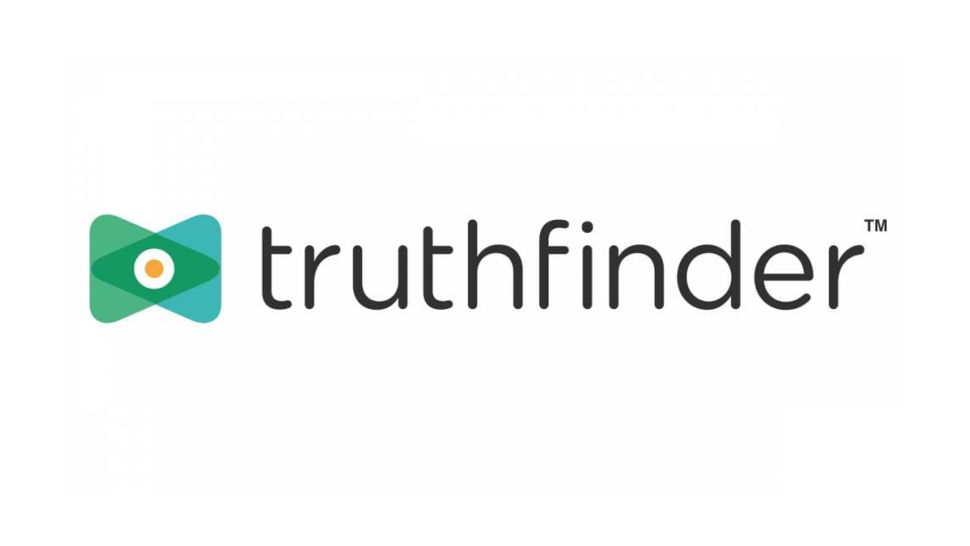

What is TruthFinder?
TruthFinder is one of the best people search sites on the market today. It uses public records to provide you with people’s identity information, including family members, location history, and criminal records. If you don’t have a name to start with, the platform also enables you to perform searches using a phone number, address, or email.
What does TruthFinder do?
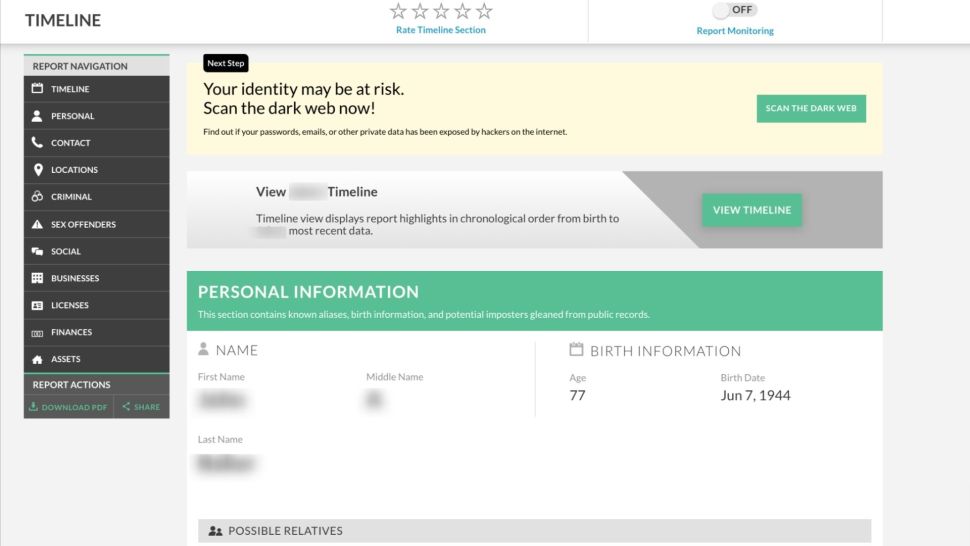
TruthFinder offers background checks sourced from public records, enabling you to do the following:
- Quickly search through databases using just a name, phone number, email address, or physical address
- View someone’s family members, location history, employment and educational background, property ownership, and—where relevant—criminal records and traffic violations
- Access someone’s contact details, such as email addresses and phone numbers
- Identify social media and online dating profiles which are likely used by the queried person
- Get an overview of someone’s credit history, including debt levels and bankruptcies
- Uncover basic identity details, such as name and location, by reverse-searching a phone number
- Find out whether you’ve been a victim of identity theft by querying your own records using TruthFinder’s Dark Web search
How consumers can use TruthFinder
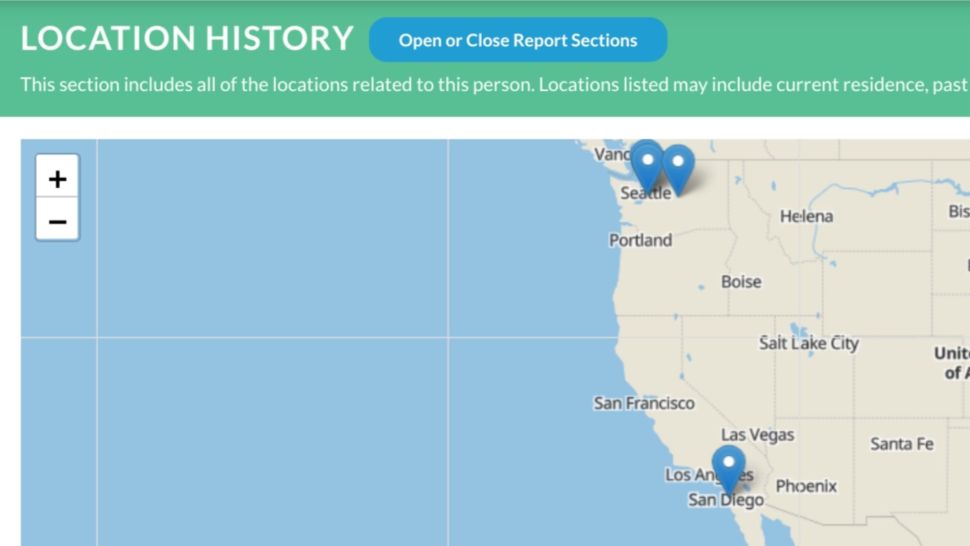
Background checks provided by TruthFinder cannot be used for employment or tenancy screening purposes in the USA, since they do not comply with the Fair Credit Reporting Act (FCRA). However, TruthFinder has lots of benefits for personal use, including the use case examples below.
Relatives
Re-engaging with long-lost family members, like cousins you haven’t seen since childhood, is possible with TruthFinder’s name search. The company’s background check can include current and past addresses, names of family members, and education history, which you can use to correctly identify the relative based on the information you already hold on them.
Once you’ve validated their personal details, contact details provided in the report—such as email address, phone number, and social media profiles—can enable you to re-establish contact with the relative. A current address is also likely to be included, which you can use to send a letter or arrange a visit.
Neighbors
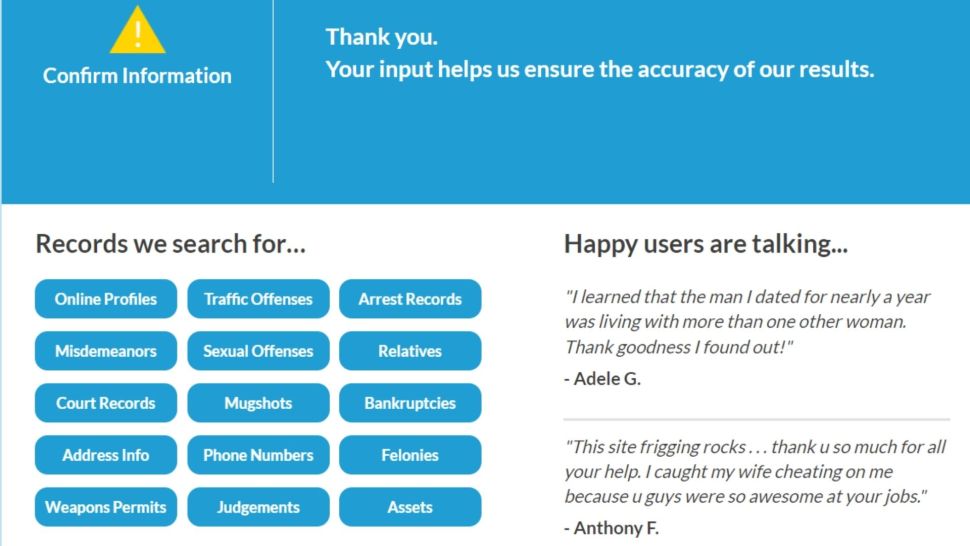
Whether a new family has just moved next door or you’re arranging a playdate for your child, you can retrieve important background information about those near to you, starting with a name or an address. Results such as previous residential addresses, criminal records, bankruptcies, and details about family members can help you verify someone’s statements, so that you can proceed with your activities feeling at ease.
Dating prospects
Sometimes, you want to make sure the person you allow into your life is being truthful. For example, meeting up with someone from a dating app can be a more comfortable experience if you fact-check important elements in advance. If you have their full name or phone number, you can get instant results on TruthFinder.
Get the ITPro daily newsletter
Sign up today and you will receive a free copy of our Future Focus 2025 report - the leading guidance on AI, cybersecurity and other IT challenges as per 700+ senior executives
Should you find unsavory details in the person’s location history, employment background, criminal record, or social media profiles—for instance, that they are already married—at least you know where you stand.
Business associates
The individuals you’re in business with—be they investors, clients, or suppliers—could potentially affect your financial position or get close to the people in your life. So, it may be useful to know critical details from their background checks, such as their criminal records, traffic violations, owned assets, and any bankruptcies or debt they may have.
While you cannot use TruthFinder to make employment or tenancy decisions, you can use it to validate business information that your associates have provided you with.
Property seekers
TruthFinder allows you to begin a search using a property address, and offers detailed property data in its background checks, including the number of rooms, ownership history, and local census data. This information is especially useful if you’re a prospective property buyer or realtor in need of a quick property snapshot and ownership details.
Similarly, if you’re a tenant planning to make a rental offer, getting details on the owners and the local neighborhood—including a list of registered sex offenders—could help inform your decision.
Features and benefits of TruthFinder
Personal information
Information such as full name, age, family members, and current location can help you fact-check data that someone has given you—such as a prospective partner. These details can also be used to check that you’ve got the right person, and, hence, that the ensuing information is relevant to your search.
Location history
TruthFinder offers a list of current and past locations at which an individual has been registered. You can visualize the addresses on a map and even access street view—which saves you from going to Google Maps, if, say, you’re browsing properties to buy by address. Additional property details include possible neighbors, previous owners, and demographic statistics.
Contact details
Likely phone numbers and email addresses registered with the individual may appear in their background check. Though TruthFinder cannot guarantee that these contact details belong to the person you’re searching for, it’s a risk some users are willing to take, if, for example, they’ve lost contact with a family member.
Social media
Where possible, TruthFinder includes individuals’ social media profiles, including Facebook and Twitter, along with likely images of the queried person. Such alternative ways of contact are particularly useful if the report doesn’t include phone numbers or email addresses. Additionally, a reverse email search could reveal potential dating profiles—which may be of interest to current or prospective partners.
Criminal records
Though it can contain unpleasant findings, the criminal records feature is important for users who are cautious about letting someone new into their lives or around their children. Details about the charges or offenses in this section are sourced from government agencies, such as the FBI. A list of sex offenders residing around the person’s area of residence is also included in TruthFinder background checks.
How much does TruthFinder cost?
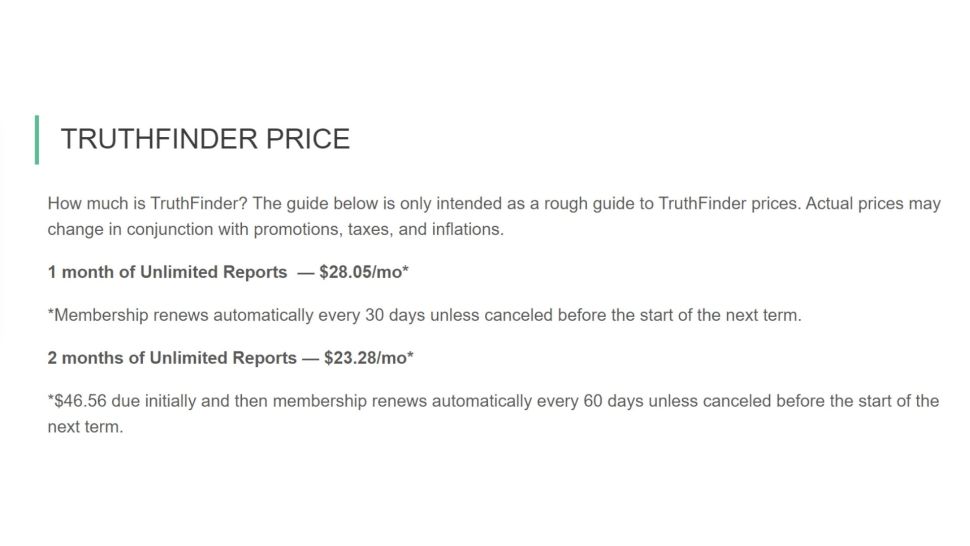
TruthFinder is a paid people search service, charging $28.05 a month, billed monthly, for unlimited background checks. While there is no annual billing option, you can pay $46.56 for two months at a time, which saves you 17% compared to monthly billing.
If that feels too steep, there’s good news: unlimited reverse phone number searches are priced at $4.99 a month, billed monthly. However, this plan doesn’t include name, address, or email searches, and returns limited results on an individual compared to a full background check.
There is no option to buy a one-off report, which some competitors including PeopleFinders and Whitepages offer on top of monthly subscriptions. Though not officially advertised, a limited trial priced at $1 for five reports only may be offered by TruthFinder’s algorithm when users attempt to close the website window.
TruthFinder FAQs
Is TruthFinder legitimate?
TruthFinder taps into public records to compile individual reports—including county, state, and federal records—so its business is legitimate. If you’re concerned about your information being available to other TruthFinder users, you can ask the company to remove your details from its systems. If you’re looking for background checks to help you make employment or tenancy decisions, however, you should look for other solutions that are FCRA compliant.
Is there a fee for using TruthFinder?
TruthFinder charges $28.05 for its services on a monthly basis, or you can pay $46.56 for two months at a time for an overall discount. Sometimes, users are also offered a one-off $1 trial consisting of five reports. Most solutions on the people search market charge fees for background check data, including contact details, location history, and criminal records.
How do I get TruthFinder for free?
TruthFinder does not offer a free plan or trial for its people search services. Without a subscription, performing a name search will only return a list of potential matches, followed by their age, family members, and registered cities of residence. If you’re on a budget and don’t require advanced details such as criminal records or asset ownership, try free websites with robust people search results, such as That’s Them.
Can someone see if you look them up on TruthFinder?
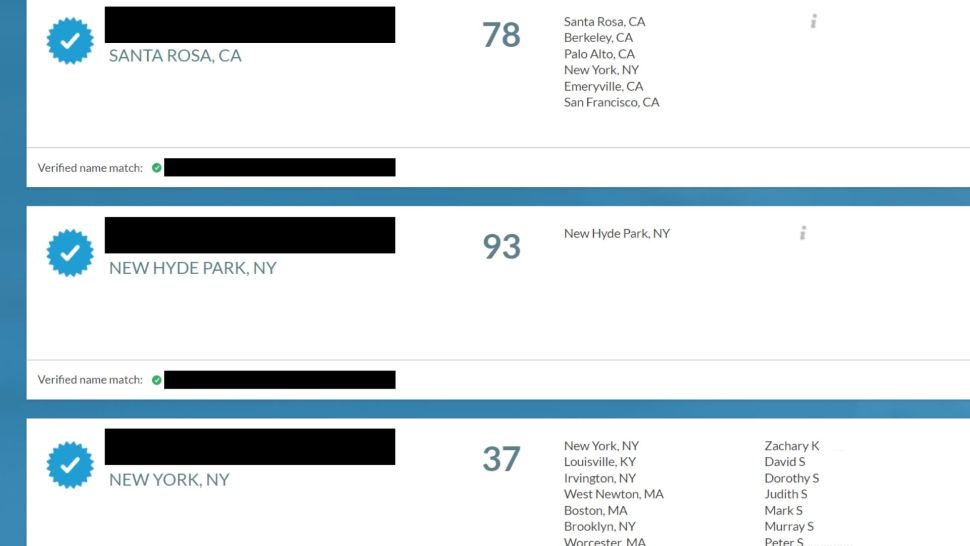
TruthFinder claims that the individuals you check on the website will not get notified of your search. Additionally, the data saved to your account, such as past searches, is secured with 128-bit encryption, which is a common industry standard.
Main takeaways
Here are the key points you should remember about TruthFinder:
- TruthFinder is a background check provider for consumers which provides information including someone’s location history, contact details, and criminal records
- Users who might benefit from TruthFinder’s background checks include those wanting to reconnect to long-lost relatives or verify a blind date’s identity
- If you don’t have a name, you can query TruthFinder’s records using a reverse phone number, email, or address search
- To use TruthFinder, you must pay either one or two months in advance, though you may also get offered a trial for $1
- While TruthFinder is a legitimate business that utilizes public records, you cannot use it to make employment or tenancy decisions
Further reading on people finders
For budget-friendly alternatives when looking for people finders, you can check out our best free people search sites, and learn Discover how to find someone for free on the internet. If you're looking for a premium search platform, make sure to check out our guide to the best people search sites.
Ioana holds a BSc in Business Management from King's College London, and has worked for over four years as a management consultant in the industries of technology, media and telecoms. Ioana is also a successful entrepreneur, having launched several social enterprises. Writing interests include market research and planning, start-up culture and ethics, agile methodology, and financial modelling. No stranger to tech and hackathons, she is also an accomplished fintech and SaaS writer.
-
 Bigger salaries, more burnout: Is the CISO role in crisis?
Bigger salaries, more burnout: Is the CISO role in crisis?In-depth CISOs are more stressed than ever before – but why is this and what can be done?
By Kate O'Flaherty Published
-
 Cheap cyber crime kits can be bought on the dark web for less than $25
Cheap cyber crime kits can be bought on the dark web for less than $25News Research from NordVPN shows phishing kits are now widely available on the dark web and via messaging apps like Telegram, and are often selling for less than $25.
By Emma Woollacott Published
-
 Put AI to work for talent management
Put AI to work for talent managementWhitepaper Change the way we define jobs and the skills required to support business and employee needs
By ITPro Published
-
 The future of HR and talent in the age of generative AI
The future of HR and talent in the age of generative AIWebinar Transform your people management, support your workforce, and optimize your HR strategy
By ITPro Published
-
 Digital experience has to be at the heart of employers’ recruitment drives
Digital experience has to be at the heart of employers’ recruitment drivesSponsored As the Great Resignation rolls on, businesses need to live up to candidates expectations or risk losing out on top talent
By James Harvey Published
-
 Little is being done to address the tech industry's racial hiring bias, report
Little is being done to address the tech industry's racial hiring bias, reportNews Non-white individuals are far less likely to be offered an interview compared to other applicant groups, research shows
By Ross Kelly Published
-
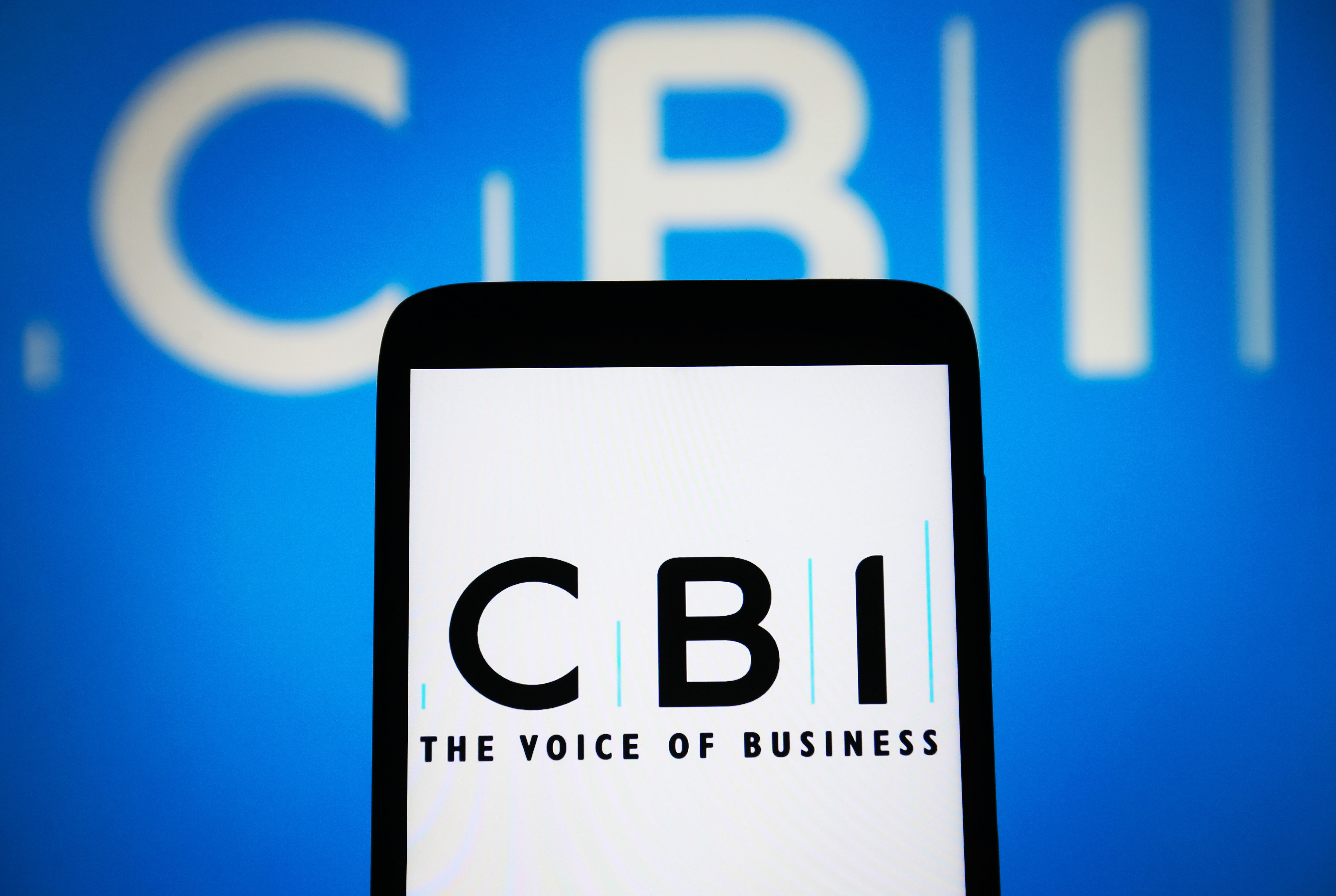 Can the CBI survive its misconduct scandal?
Can the CBI survive its misconduct scandal?News The industry trade body has been embroiled in one of the largest scandals in British business history in recent weeks
By Ross Kelly Published
-
 How to choose an HR system
How to choose an HR systemWhitepaper What IT leaders need to know
By ITPro Published
-
 Amazon staff reportedly launch campaign to reverse 'shock' worldwide return to office plans
Amazon staff reportedly launch campaign to reverse 'shock' worldwide return to office plansNews An internal petition calls for CEO Andy Jassy to roll back planned requirements for corporate staff to return on a three-day basis
By Rory Bathgate Published
-
 The tech industry needs to unionise now more than ever
The tech industry needs to unionise now more than everOpinion Companies hoping to boost productivity should embrace unionisation so employees aren’t constantly anxious over job security or childcare arrangements
By Rory Bathgate Published